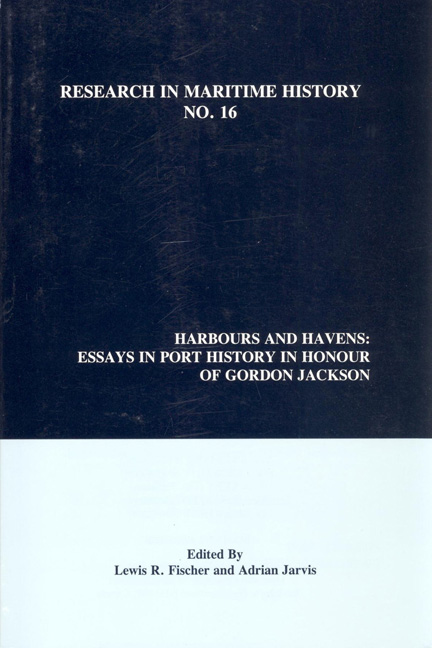Book contents
- Frontmatter
- Contents
- About the Editors
- Contributors
- Introduction
- “Gordon Jackson: An Appreciation”
- “Port History: Some Thoughts on Where it Came from and Where it Might be Going”
- “Port Politics: Interest, Faction and Port Management in Mid-Victorian Liverpool”
- “Our Little Company:' The Wilsons and North Eastern Railway Shipping Company Limited, 1906-1935”
- “The Changing Functions of a Rural Port: Dumfries, 1700-1850”
- “Australian Ports Since 1945”
- “Aspinall, Cornes and Company and the Early Development of the Port of Yokohama”
- “Dubai: From Creek to Global Port City”
- “New York's German Suburb: The Creation of the Port of Bremerhaven, 1827-1918”
- “Capital and Labour in the Port Town of Esbjerg, 1945- 1999”
- “Port Policies: Seaport Planning around the North Atlantic, 1850-1939”
- “Gordon Jackson: A Bibliography”
“Port Policies: Seaport Planning around the North Atlantic, 1850-1939”
- Frontmatter
- Contents
- About the Editors
- Contributors
- Introduction
- “Gordon Jackson: An Appreciation”
- “Port History: Some Thoughts on Where it Came from and Where it Might be Going”
- “Port Politics: Interest, Faction and Port Management in Mid-Victorian Liverpool”
- “Our Little Company:' The Wilsons and North Eastern Railway Shipping Company Limited, 1906-1935”
- “The Changing Functions of a Rural Port: Dumfries, 1700-1850”
- “Australian Ports Since 1945”
- “Aspinall, Cornes and Company and the Early Development of the Port of Yokohama”
- “Dubai: From Creek to Global Port City”
- “New York's German Suburb: The Creation of the Port of Bremerhaven, 1827-1918”
- “Capital and Labour in the Port Town of Esbjerg, 1945- 1999”
- “Port Policies: Seaport Planning around the North Atlantic, 1850-1939”
- “Gordon Jackson: A Bibliography”
Summary
In most nations around the North Atlantic littoral, the suggestion that it would be advisable to engage in long-term economic planning has generally met an icy reception. Indeed, despite a good deal of self-serving rhetoric, few countries have ever engaged in this exercise even in the short term, and most of those that have are located in Scandinavia. The generalization that planning has been ignored also applies to Canada where, notwithstanding the advocacy of this idea on the right by bodies such as the Science Council and on the left by the New Democratic Party, more centrist (and, dare I say it, more “central“) groups have consistently argued successfully against such a “heresy.“
There is a maritime equivalent to the idea of opposing economic planning: the argument that it is a bad idea to have any kind of national ports policy. In the seminal History and Archaeology of Ports, Gordon Jackson noted that there has never been a ports policy in Britain - and he could have added that this was also the case virtually everywhere else. But what is significant is that Canada, which has never been an apostle of planning of any sort, actually came close in the interwar period to being the exception that proved the rule.
This brief essay describes the abortive proposals for a national ports policy in Canada and offers an explanation for why in the end it was never enacted. In order to place the Canadian experience in some kind of context, it also offers a very broad overview of developments elsewhere around the North Atlantic, concentrating mainly on the period from 1850 to the outbreak of the Second World War. Taken as a whole, the experiences of North Atlantic nations suggest strongly that Gordon Jackson's generalization can profitably be extended beyond the British Isles, albeit with some caution.
The second half of the nineteenth century was in maritime terms really quite a remarkable era. When it began, the economic doctrine of mercantilism was just beginning to be superseded around the North Atlantic by the new dogma of free trade. The former, of course, held that the best way for a nation to achieve wealth was to plant colonies.
- Type
- Chapter
- Information
- Harbours and HavensEssays In Port History In Honour Of Gordon Jackson, pp. 229 - 244Publisher: Liverpool University PressPrint publication year: 1998



